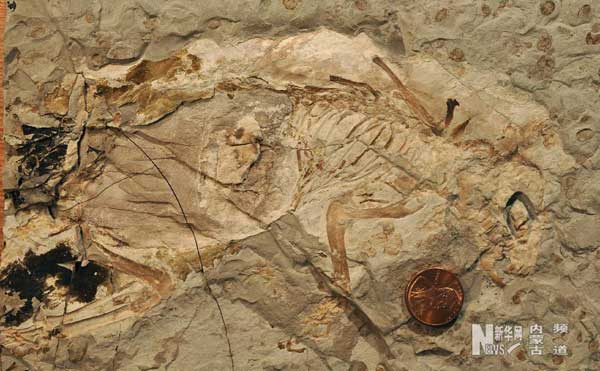Scientists find fossil of 'proto-mammal'
 0 Comment(s)
0 Comment(s) Print
Print E-mail Shanghai Daily, August 9, 2013
E-mail Shanghai Daily, August 9, 2013
|
Scientists believe the well-preserved fossil of the Megaconus mammaliaformis, a herbivore with hair and fur that lived during the Jurassic era about 165 million years ago, was about 30 centimeters long and weighed an estimated 250 grams.[Xinhua] |
The newly discovered fossil of a "proto-mammal" unearthed in Inner Mongolia Autonomous Region has shed light on the evolution of the world's earliest mammals.
Scientists believe the well-preserved fossil of the Megaconus mammaliaformis, a herbivore with hair and fur that lived during the Jurassic era about 165 million years ago, was about 30 centimeters long and weighed an estimated 250 grams.
Zhou Changfu, a scientist with the Paleontology Museum of Liaoning and Shenyang Normal University, led the research program with scientists from the University of Bonn and the University of Chicago.
Zhou said yesterday the rare evidence of the animal's fur proves it had the skin texture of a mammal, but it is still unknown whether it had a bare midriff that enabled it to feed a newborn cub or it had a brood pouch.
The earliest mammaliaform groups are long-extinct relatives of modern mammals that co-existed with feathered dinosaurs in the Jurassic era. Prior to the discovery of the fossil, no complete fossils of these earliest mammals had ever been discovered, he said.
He said the animal's lower jaw, thoracic vertebra, lumbar vertebra and ankle joint all suggest it had evolved from reptile to proto-mammal, Zhou said.
The fossil was unearthed from the Daohu Groove in Ningchen County, Inner Mongolia, where scientists have also unearthed other fossils of early mammals such as the Jurassic beaver, which appeared after the Megaconus mammaliaformis.
An article on the discovery was published in the issue of Nature yesterday.







Go to Forum >>0 Comment(s)